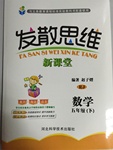题目内容
They woke up ________ everything around ________.
[ ]

 发散思维新课堂系列答案
发散思维新课堂系列答案This morning as I was getting the children ready or school, I helped them prepare breakfast and pack their lunches. I reviewed spelling words with them and made sure that their homework was collected in their bags. I had seen the weather forecast for the day and knew it was going to remain cool all day. I suggested they wear sweaters for the walk to the us stop. My kids chose to repulse my advice. My son decided that all he needed was a T-shirt, not a sweater.
I didn’t force(强迫) them to wear sweaters and we went to the bus stop. It is a full kilometer walk to the top of a treeless hill and the wind felt like a knife cutting through the skin. My children endured(忍受) the cold until halfway, when I gave them with the sweaters I had quietly carried under my arm. Then took them without complaint, and I bit my tongue from saying, “I told you so.”
What I was asking my children to do was to trust me. Trust Mom to have their best interests in mind. Trust Mom to know what she is talking about. Even though they didn’t know that I had read the outdoor thermometer (温度计) before they woke up and I had seen the day’s weather forecast, I wanted them to trust me. By ignoring me, they were saying that they didn’t believe I knew what was best for them. What they knew was that yesterday was a warm enough day for shorts. What they knew was that it was warm enough in the house to wear shorts. Therefore, they felt sure enough to make their own decision on what to wear outside.
Too many times we depend on what we know of yesterday, and how we feel today, and so we make decisions based on them. Too many times we think that we know better, so we can deal with things better. But we are wrong.
【小题1】It can be inferred from the first paragraph that .
| A.the author didn’t believe in her children |
| B.the author took her children to school every morning |
| C.the author’s children always followed her advice |
| D.the author had a very busy morning that day |
| A.refuse | B.follow | C.seek | D.doubt |
| A.The author’s children always ignore her. |
| B.The author takes great care of the children in life. |
| C.The author’s children always make wrong decisions. |
| D.The author always force her children to wear sweaters. |
| A.tell the readers how to ask for advice |
| B.offer advice on how to teach children |
| C.explain the importance of trusting others |
| D.give advice on how to make decisions |
Scientists have proved that sleeping and learning go hand in hand. Even a short nap can boost our memory and sharpen our thinking. But the relationship goes deeper than that.
“The brain is not passive while you sleep,” scientist Anat Arzi said. “It’s quite active. You can do many things while you are asleep.”
Arzi and her coworkers didn’t try to teach the sleeping volunteers any complex information, like new words or facts. Instead, the scientists taught volunteers to make new connections between smells and sounds.
When we smell something good, like a flower, we take deep breaths. When we smell something bad, we take short breaths. Arzi and her co-workers based their experiment on these reactions.
Once the volunteers fell asleep in the lab, the scientists went to work. They gave them a whiff of something pleasant and meanwhile played a particular musical note. They didn’t wake up, but they heard—and sniffed(吸气) deeply. Then the scientists gave the volunteers a whiff of something terrible and played a different musical note. Again, the volunteers heard and smelled—a short snort this
time—but didn’t wake up. The researchers repeated the experiment.
After just four repetitions, volunteers made a connection between the musical notes and their paired smells. When the scientists played the musical tone that went with good smells, the sleepers breathed deeply. And when the scientists played the musical tone that went with bad smells, the sleepers breathed briefly—despite there being no bad smell.
The next day, the volunteers woke up with the sound-smell connection. They breathed deeply when hearing one tone and cut their breaths short when hearing the other, which must have been unusual for them. Imagine walking down the street and taking a deep breath upon hearing a particular sound!
【小题1】In the study, the volunteers were taught _______.
| A.to become active during sleep |
| B.to tell the difference between smell |
| C.to learn new words and scientific facts |
| D.to make sound-smell connections |
| A.They took a deep breath. | B.They had a wonderful dream. |
| C.They woke up at once. | D.They took a short breath. |
| A.learned how to play to musical tones |
| B.forgot what happened during their sleep |
| C.continued with the sound-smell connection |
| D.changed their reaction when hearing. |
| A.special smells and sounds can improve our memory. |
| B.our brain can actually learn something new during the sleep. |
| C.the volunteers will always hear similar sounds in the street. |
| D.our brain can tell the difference between smells during the sleep. |
| A.A short sleep can improve our memory and sharpen our thinking. |
| B.Arzi and her coworkers didn’t try to teach the sleeping volunteer some simple information. |
| C.When the volunteer smelt something terrible, they didn’t wake up. |
| D.After four repetitions, volunteers made a connection between the musical notes and their pared smells. |
They woke up ______ everything around ______.
|
A.found; changed |
B.only to find; changed |
|
C.to find; changing |
D.finding; changed |